Mammoth (Dawn of Mammals Book 5) Read online
Page 12
Hannah went in the igloo to check on Zach. He was asleep, and Jodi was curled next to him. “How is he?”
“Sleeping, not very restless. Still hot, but not burning up,” Jodi said.
“Good. We’ll get him more tea before night falls. Now I’ll watch him while you go eat.”
“There’s food?”
“Soup. There’s some fat drops floating on the top, and that’s the important bit of it. You might want to warm yours up with another rock from the fire.”
“How about Zach’s?”
“Save his portion and you can feed it to him when he wakes. You and I and everyone who can are leaving at dawn to hunt mammoth.”
“Do I have to leave him?”
“Nari and Bob will take good care of him. I won’t forget to leave the rest of the bark with them this time. Bob should be taking a cup every day himself. It won’t be that big a deal for him to make a second. And Nari is a good nurse.”
“I wish I could stay.”
“We need food. Zach needs it more than anyone. He hasn’t been eating much, and his body needs something to work with to make him get better. So the best thing you can do for him is to go with the hunting party.” Six of them sounded much less likely to succeed than seven of them. She wished, for all the good wishing did her, they were still twelve. Twelve healthy people might have a chance at corralling a mammoth and killing it before the herd killed one of them. With only seven, it was going to be a much harder job.
And all seven of them would be at greater risk.
Chapter 14
As everyone gathered to leave, Hannah double-checked her pack to make sure the willow bark wasn’t in there again. It wasn’t. She remembered handing it to Bob last night, but she wanted to make sure.
A gusty wind whipped her hair around, though the skies were clear. The wind picked up flakes of dry snow and drove them into her cheeks.
Claire said to Nari, “I’m sorry to be taking so many of the hides.”
Nari shook her head. “You guys need them to wear. We can stay inside most of the time. And the igloo is warm, even with only three people in there. We’ll survive. Just make sure you all do too.” She hugged Claire and then went around and hugged everybody, one by one.
Bob, probably still cognizant of school rules about sexual harassment, saved his only hug for Hannah. “Stay safe,” he said.
“It’s the first priority.”
“Good luck hunting, everyone,” Bob said, releasing Hannah. “Or break a leg, or whatever you say to a hunting party.”
“Not break a leg,” Dixie said, laughing. “That’s theater.”
“Breaking a leg would be a terrible idea for a hunter,” Claire said. “But I appreciate the intended message.” She finished stuffing her basket pack with her gear and slung it on.
Seven of them were ready to go, all of them carrying a weapon, all of them in a hide cape and fur mittens. Nari, over the days, had managed to attach a small furry pelt to the tops of most of the capes, so they had a collar that helped keep them warm. Ted in the hide pants and Laina in her short hide skirt over leggings looked most like cave men of movies and art. The setting was exactly perfect for that movie. The wide expanses of white snow, the distant black hills, the crystals of ice blown around and catching the first rays of dawn light, showing little prisms for a fraction of a second before spinning away.
They aimed for where they’d had their last encounter with the mammoths. They spoke little, conserving their energy. Hannah kept her eyes peeled for signs of another animal, an antelope or something else, anything easier to kill. But all day the landscape continued to reveal an empty, lifeless world.
They halted twice, but not for long. Claire wanted them moving quickly while they still could. And there was no food to share out as a meal. They drank their bottled water and then stuffed the empty bottles with snow, carrying them between cape and shirt so that body heat would melt them. Hannah put hers in her pack, against her back. The second stop, Hannah discovered how very little water she had gotten from twelve ounces of snow. She’d have to pack it full of more snow next time, or stop every hour and drink what had melted and refill it.
“Birds,” said Dixie in the afternoon. She pointed into the sky, where a dozen birds were gliding along in the cold clear air.
They had passed the spot where the mammoths had attacked them and were following the herd’s track. It was easy to follow, not because the tracks had remained crisp and clear, but because three dozen mammoths browsing through the tundra leave a mess.
In late afternoon, Claire stopped by an uprooted and rotten tree, not the one Hannah had watched the mammoth toss around like a toothpick, but a different one. “We’ll build our shelter here. And burn this for heat and water,” she said, kicking the tree trunk.
“It’s early still,” Laina said. “We could probably wait forty-five minutes to camp.” She checked her—once Hannah’s—watch.
“It’s a good spot,” Claire said. “I like the tree. And I don’t know yet how long it’ll take us to build a shelter.” She directed everyone else to roll snowballs for the walls.
Hannah had brought tinder, and others had carried straw for bedding, so she had plenty to start a fire with. She made her way along the tree, looking for a dry and rotten spot that went deep. She found a soft spot that wasn’t too damp, and she took out a stone knife and cut into the soft spot. Once she had a fist-sized hole in the rotten spot, she began building her nest of tinder. The wind had died down, so she left it sitting there to continue stripping bark off the tree, skipping over the wetter spots. She had a double handful of bark ready to feed into the fire.
She took out her magnesium fire-starter and set the tinder aflame. The first fire went out, and she lit it again. The second try, with judicious puffs of breath, she kept it going. Feeding in fuel a bit at a time, she waited until there was a hearty blaze of dried grass going, and built a teepee of bark over that. The bark only released steam at first, but in another two minutes, the edges of it caught fire. Hannah left the fire to its own devices to go shave more wood off the tree. Nubs of branches would work, too, anything small to keep the fire going until the log itself caught.
Laina came over to look at the tiny fire. “Nice job.”
“I don’t know if it’ll stay lit. If we leave it smoldering, do you think it could catch the whole tundra on fire?”
“No, not with all this snow. Underneath, there are plenty of bare patches of ground.”
“Okay. I didn’t want to start a wildfire and cut us off from the igloo.”
“Not the thing to worry about,” Laina said.
“You want to watch the fire, and I’ll help build the shelter for a while?”
“No, you’re doing fine. We’ll get the shelter done soon.”
The shelter was little more than another snow fort, though much bigger. Rex figured out a way to adapt the igloo design to build a slanted snow roof. Before the top was finished, they were piling straw on the bottom to sleep on, protecting themselves from sleeping directly on snow. Hannah made sure the fire was burning nicely, and then she turned away to dig among the browsing route of the mammoth, looking for rocks for the fire. She found a big pile of mammoth dung and poked at it. It was frozen solid. They were a day or more behind the herd. There was a lot of vegetable matter in the dung. It’d make good fuel, once it had dried for a week or two. This frozen and still watery dung would only put out her fire.
She hunted for small rocks, small enough to fit through the neck of a water bottle. They’d melt the snow faster that way, be able to drink their fill tonight, and—as long as the fire kept smoldering all night—be able to start the day with full bottles again.
When the shelter was finished, they had a half hour of twilight left. Hannah spent the time melting snow into water. Ted checked all the spears for damage. Jodi sat alone, looking in the direction they’d come from, pensive. Dixie and Claire spoke quietly together. Rex fiddled with rope. Laina watched him for a ti
me, and then she took her atlatl and plucked a couple of spears from where Ted had shoved them into the snow, and walked off several paces to practice her throwing.
As twilight waned, they all crawled into the temporary shelter and shivered under their capes and extra hides. It warmed up soon enough, and Hannah slept.
The second day was much like the first. By the afternoon, Hannah found mammoth dung that was only partly frozen. She used a spear butt to knock it apart, curious what the mammoths were eating. There was undigested branch material, thick yellow roots that hadn’t been chewed much, and black seeds.
The third morning, Hannah crawled from that night’s shelter and stood. Her vision dimmed, and she groped for the side of the shelter, finding it and hanging on. It was a blackout—from lack of food, she imagined. But not a total one. She had managed to stay on her feet, and the world came back into focus just before her legs would have let her down. She swayed while her senses fully returned, took a couple of shallow breaths, and thought about dying from starvation. Maybe it wouldn’t be too bad. The dizzy spell had been rather pleasant, like a champagne high. If the whole experience was like that, it wouldn’t be awful.
And it’d be a hell of a lot better than getting stepped on by a mammoth and lingering for a week with painful internal injuries.
A few hours later, she had changed her mind about starvation being at all pleasant. Her stomach cramped. All she could think about was food, hunger, or meals of the past. She wasn’t the only one.
“Remember the burrowing animal?” Jodi said, on their first break. “The one Mr. O’Brien cooked up that was so good?”
“I do,” Hannah said.
Some murmurs of agreement, and Dixie said, “I missed eating that. It was really good?”
“Wonderful,” said Jodi.
“I remember the first time I ate salt again, on the fish,” Ted said. He was on his knees, packing his bottle with snow. “That was good too.”
“Hard to believe it was only a few weeks ago,” said Claire. “We still have salt, right?”
“Yeah,” Hannah said. “Back in storage.”
Claire stood and shouldered her basket pack again. “So, all we have to do today is find something to salt.”
Laina said, “We’re getting closer. The trail is fresh now.”
Claire said, “Dixie, keep your eyes open and let us know when you catch sight of them.”
“I will.” Dixie sounded a little nervous. Hannah didn’t blame her. She’d been that close to dying at the hands—or tusk or trunk or foot—of a mammoth. When Dixie touched her stomach lightly, Hannah knew what she was thinking of.
As they walked, she tugged Dixie’s cape and indicated with her head that she wanted to lag behind the group and talk. Dixie slowed and Hannah said, “Have you been thinking about names at all? For the baby?”
“A little. I was hoping Ted would come around, and I’d ask his opinion, but I don’t think that’s going to happen.”
“Maybe not immediately. But give him a chance. It could be that when he sees the baby, it’ll do something to him.”
“I don’t know that I care that much any more if he does or not. I’m starting to think of it as mine. All mine, if that doesn’t sound too selfish.”
Dixie had in fact never sounded less selfish than she had since she had gotten pregnant. Hannah had given the matter some thought, and she thought now that she’d seen a change in her some weeks ago, but it had taken a little while to register on Hannah. The change was sticking, too, at least for now. “So, if it’s a boy?”
“That’s hardest. I’m not sure. Something I like the sound of. Travis, maybe. Pretty but still masculine.”
“And for a girl?”
“Maeve, for sure. That’s an aunt of mine I really like. If I never see her again, it’ll make me remember her. And if a kid of mine could grow up like that, I’d be awfully proud.”
“Tell me about her. Your aunt.”
Dixie talked about her aunt, and they walked a little faster and caught up to the group. The aunt was a single woman, a world traveler, and lately seemed to always pick younger boyfriends, which impressed Dixie. “She’s always wearing these weird outfits, made up of whatever she bought in India or Chad or Guatemala, maybe a silk scarf from a New York boutique, or whatever, and all thrown together. On her, they look amazing. The clothes create her own special look, but she has such a personality that she makes these outfits work that wouldn’t work for anyone else. I’d just look mismatched in them, if you know what I mean.”
Hannah said, “I do. She sounds like one of a kind.”
“She is, a real individual. You know, in high school, everybody is kind of in a clique. People dress like each other, talk like each other, do the same things as everyone else in their clique.”
“I recall that from high school,” Hannah said, though she had been part of no group at all, unless “outcasts” were a group.
“But Aunt Maeve wouldn’t ever do that kind of thing, join a clique. She might start a movement, but she’d never follow. I’d like a daughter of mine to be like that.”
Hannah glanced at the back of Ted’s head to see if he reacted to that at all, but he didn’t cringe or jerk. If he was flushed, she couldn’t tell. He was wearing the fresh and untanned hide, and he was beginning to smell of it. Last night, in fact, the whole igloo had smelled of it. Claire had pointed out when someone commented it smelled bad that it was a good thing it did, that the more Ted smelled like that, the closer he’d be able to get to the mammoths.
They finally spotted the mammoths two hours before sundown. They were about a mile ahead. Laina stopped the hunters, tested the wind with a bare hand, and said, “It’s blowing very mildly from our left to our right. So we shouldn’t drift left.”
“How close did you get last time, before they took notice of you?” Claire said.
Ted answered, “Pretty close—a few hundred yards. But that experience might have taught them to be more cautious of us.”
Claire said, “We’re not going to be us. At first, we’re going to be you, smelling like an antelope. Okay, so they seem to be moving still. Let’s keep after them. Drink and refill, everyone.”
After that first night with the log, they’d not found any more firewood, so all that they drank had to be snow melted by body heat. In the dry air, walking steadily, they needed a lot of water. Hannah wished for a fresh gallon. Maybe she could fool herself into thinking she was full by chugging a gallon of water.
When the mammoths stopped, so did Claire. “Do you think they’re stopping for the night, everyone?” she asked.
“They must,” Ted said. “They have to rest sometime, right?”
“Makes sense to me,” Rex said. “They’re daytime hunters—or browsers, I mean.”
“I wonder,” Hannah said, “if they have bad night vision. We might be able to sneak up on them in the night.”
“I have terrible night vision,” Jodi said. “Never could see a thing in the dark.”
“We have Hannah’s flashlight,” Claire mused. “But that’d let them see us approaching, even if they don’t understand what a flashlight is. And I don’t know how well they see in the dark, so they might have the advantage then, not us. No, I don’t think a nighttime approach is the answer.”
“I’d hate to have one sneak up on me in the dark,” Dixie said. “You might feel them running, through the vibrations in your body, but to not know if they were aiming at you or not, or where they might hit you from?” She shuddered. “No, thanks.”
“Yeah,” Claire said. “So we’ll bed down back there by those rocks, and whoever is awake when the sky begins to lighten at all, you wake us all up. We’ll move in on them at first light. And Ted’ll move the closest.”
“Probably good to take advantage of the twilight for that,” Laina said as they backtracked. “Most animals don’t see as well in it. It’s harder for them to judge distance.”
“Okay. Let’s dig in here for the night,” Clair
e said.
Hannah helped roll giant snowballs. They were done with their snow fort in plenty of time. The straw was laid in. They wandered away to relieve themselves one by one, and after Hannah had done so, she came back to find Dixie building little decorative snowmen for the corners of the shelter. Two were up, and she was rolling up more balls for the next.
Nesting instinct? Maybe. Having never been pregnant, Hannah had no idea if that was a real thing. Hard to tell the myths from the reality in the world they’d grown up in. But here, in this natural world, with Dixie not being able to read anything on the internet and get psychosomatic symptoms as a result, she had to assume this was real. Pregnancy was mellowing Dixie, making her more sympathetic—or at least not cruel—toward others, and possibly was making her want to decorate the shelter. Fascinating.
She watched in amusement while Dixie finished the last snowman and then hunted on the ground for small sticks the mammoths’ browsing had left behind. She jammed them in for arms. “I can’t think of what to use for hats.”
“Too bad we don’t have any of those coatings to the chestnuts,” Hannah said. “They could have been little green berets.”
“I’d rather have the chestnuts,” Dixie said. “To eat, I mean.”
“You and me both,” Hannah said. “I’m turning in.” She was exhausted—beyond exhausted—and she was weak from the hunger. She hoped the mammoth hunt would be tomorrow, and she hoped she had enough energy to break into a sprint when she needed to. If not, her life might end on the tusks of a mammoth.
As she drifted off to sleep, she wondered where that might rank on the list of worst ways to die.
Chapter 15
She dreamed of the saber tooth tiger. Tusks or being flattened might be better in the long run than teeth and claws. Or in the short run, more to the point. Getting eviscerated and fed on by a tiger while she still was conscious sounded like a bad death too. The mammoths might be quick and accidentally kind.

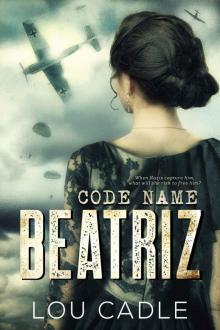 Code Name- Beatriz
Code Name- Beatriz Oil Apocalypse Collection
Oil Apocalypse Collection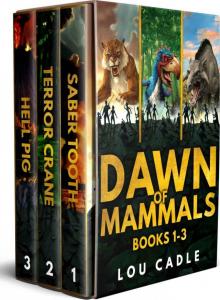 A Dawn of Mammals Collection
A Dawn of Mammals Collection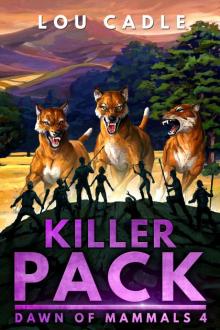 Killer Pack (Dawn of Mammals Book 4)
Killer Pack (Dawn of Mammals Book 4)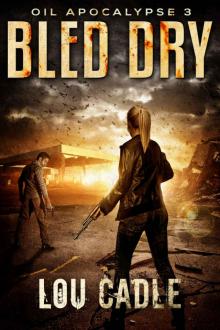 Bled Dry
Bled Dry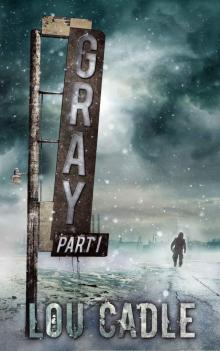 Gray (Book 1)
Gray (Book 1) Dawn of Mammals (Book 4): Killer Pack
Dawn of Mammals (Book 4): Killer Pack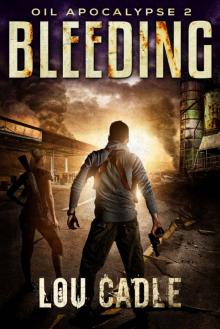 Bleeding (Oil Apocalypse Book 2)
Bleeding (Oil Apocalypse Book 2)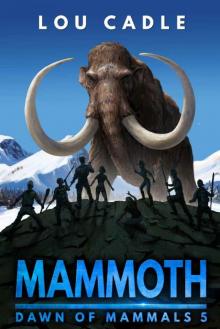 Dawn of Mammals (Book 5): Mammoth
Dawn of Mammals (Book 5): Mammoth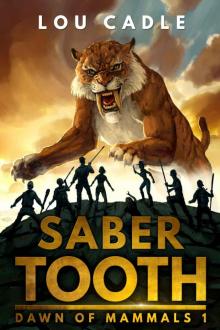 Saber Tooth (Dawn of Mammals Book 1)
Saber Tooth (Dawn of Mammals Book 1)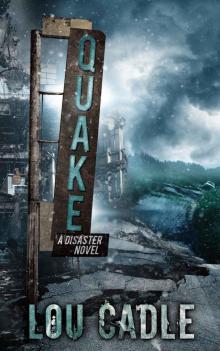 Natural Disaster (Book 2): Quake
Natural Disaster (Book 2): Quake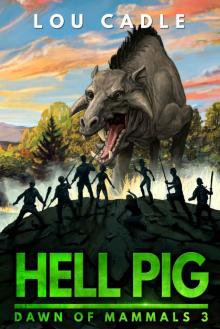 Hell Pig (Dawn of Mammals Book 3)
Hell Pig (Dawn of Mammals Book 3)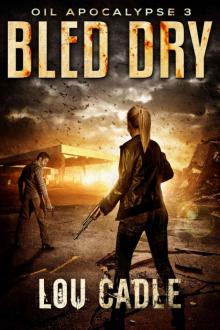 Bled Dry (Oil Apocalypse Book 3)
Bled Dry (Oil Apocalypse Book 3)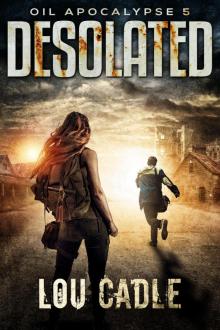 Desolated
Desolated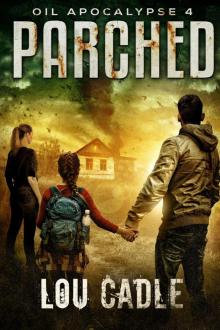 Parched
Parched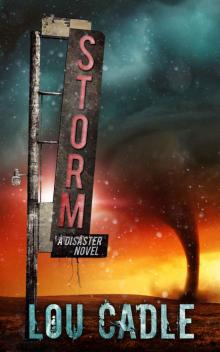 Natural Disaster (Book 3): Storm
Natural Disaster (Book 3): Storm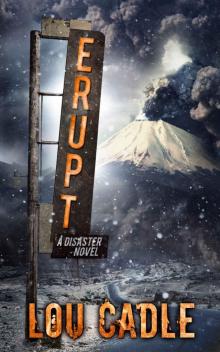 Natural Disaster (Book 1): Erupt
Natural Disaster (Book 1): Erupt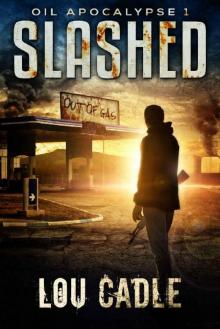 Slashed (Oil Apocalypse Book 1)
Slashed (Oil Apocalypse Book 1)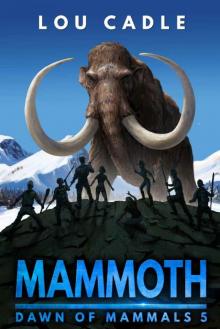 Mammoth (Dawn of Mammals Book 5)
Mammoth (Dawn of Mammals Book 5)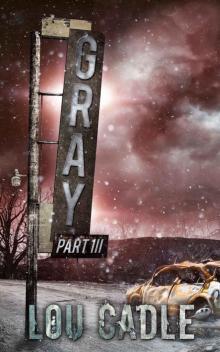 Gray (Book 3)
Gray (Book 3)